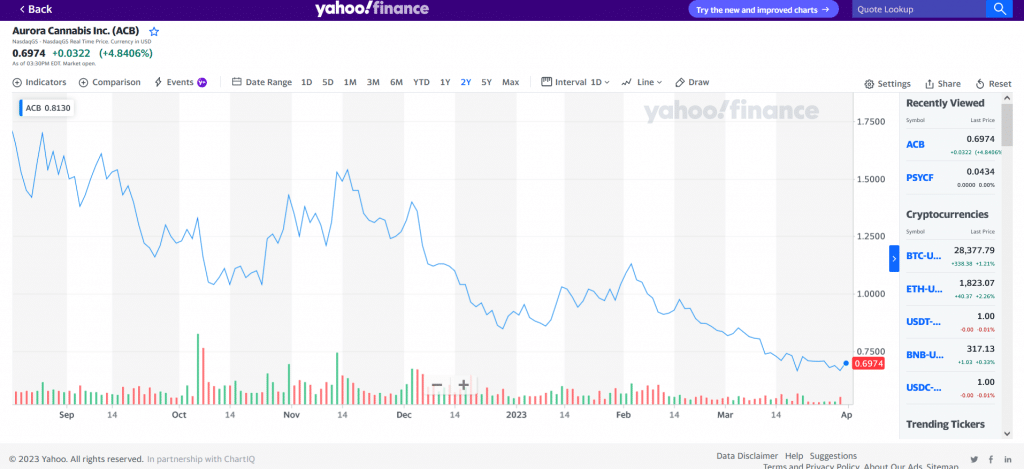Bad news and quick moves were the order of this week, and how it all works out remains to be seen. What is for sure, is that cannabis companies are having a hard time. Canadian cannabis giant Aurora Cannabis is a great example of current issues, with a recent warning by Dasdaq due to low stock prices. Read on to find out more about the situation.
A little about Aurora cannabis
Aurora was originally founded in 2006 as a growing facility. It’s a Canadian cannabis company based out of Edmonton, Alberta, which produces both medical and recreational products. It received its first license to cultivate cannabis in 2014; making it the first production company in that region to get a government clearance to do so. Also in 2014, Aurora got licensed by Health Canada to officially sell medical grade cannabis. Since that time, operations have spread globally, into Europe, Asia, Latin America, and Oceania.
By 2018 the company had eight production facilities, five sales licenses, and was operating in 25 different countries. At one point, it had funding ability to grow over 625,000 kg of cannabis per year. In early 2019, the company produced about 20% of Canada’s retail cannabis product. In June of 2019, its market capital was US$4.8 billion. Aurora trades on the Toronto Stock Exchange, and Nasdaq as ACB. It switched from the NYSE to Nasdaq in 2021.
There was a lot of expansion until 2019, and then things slowed, as recreational sales went down in Canada. Aurora had to lower sales to compete with the black market, and reduced expenses by late 2019. Stock prices slid down; and in a move not generally associated with anything good, the co-founder and CEO – Terry Booth – resigned in early 2020. That year the company lost approximately CA$3.3 billion by the end of the fiscal year, followed by shares dropping 10%.
Hi, thank you for making it. Access direct updates via the Cannadelics Weekly Newsletter; and net yourself some awesome deals on cannabis flower, vapes & smoking paraphernalia, edibles, cannabinoid compounds (like delta-8), amanita mushroom products, and a wide selection more. Go get yourself stoned, and please do so responsibly!
In June of last year the company announced it would cut 12% of its staff, and undergo corporate restructuring. In a letter to MJBizDaily, the cannabis company said it had found more ways to save up to CA$90 million; in order to get back in line, and reach profitability. The company hadn’t made a profit, and the previous hope was that 2023 would be the year to break through.
Said a company spokesperson upon layoffs and restructuring, “Today we delivered against that commitment as we announce a corporate reorganization that will allow Aurora to operate as a leaner, more agile and future-focused company, fit for success in the evolving global cannabis industry…Aurora continues to make substantial improvements to our business as we work through the phases of our transformation plan, designed to deliver shareholder value, and secure Aurora’s future as a leading global cannabis company.”
Aurora Cannabis warned by Nasdaq
On March 27th, according to a newswire.ca report, Aurora Cannabis was warned by trading exchange Nasdaq, that the company doesn’t currently meet standards of the stock exchange. The exchange holds a minimum share price of $1 (Minimum Bid Price Requirement) as per the Nasdaq Listing Rule 5550(a)(2). As per this rule, if a company cannot meet the minimum bid price requirement for a 30-consecutive business day period, it gets a warning from the exchange.
Aurora Cannabis announced it received a notification letter on March 24th, that its share price had dropped below $1 from February 8, 2023 – March 23, 2023. Aurora isn’t simply sent out the door. As per Nasdaq rules, it has 180 days since notification (until September 20, 2023) to get up to par with the Minimum Bid Price Requirement.
Should the company during that time, close with a share price above US$1 for 10 days straight, Nasdaq will notify the company that its back in compliance with the Minimum Bid Price Requirement. Nasdaq does, however, have the ability to extend this 10-day period if it feels the need, and under specific circumstances.
Technically, this was a warning letter, and doesn’t stop business in any way. As of right now, Aurora is listed as usual on the Nasdaq. As the Nadaq and Toronto Stock Exchange are separate entities with different governing laws; Aurora’s placement on the latter exchange is not affected by current dealings with Nasdaq. What the letter does overtly imply, is that Aurora Cannabis needs to do something, or it won’t survive on the exchange. And this brings us to the next move by the company.
Aurora Cannabis makes some moves
Whatever just happened with Aurora Cannabis this week, is just part of an ongoing story, for which Aurora plays a large part. The story is about the cannabis industry in general, and the recent spate of layoffs, closures, and restructuring plans, along with story after story of lost revenue. In terms of Aurora, this notification from Nasdaq is certainly a low point; and the company wasted no time in finding something it could do.
On march 30th, three days after its Nadaq warning letter, Aurora Cannabis was already in action. As per a prnewswire report, Aurora announced it had “repurchased an aggregate of approximately $46.6 million (US$34.3 million) principal amount of its convertible senior notes (“Notes”) at a total cost, including accrued interest, of $45.6 million (US$33.6 million) in cash, saving $2.6 million in annualized interest payments.” And that “Following completion of this repurchase, Aurora will have approximately $103 million (US$76 million) of Notes outstanding.”
This all sounds a little complicated, what was the purpose? It was to bring down the company’s debt and its annual cash interest costs. Basically, a showing that the company heard the warning, and is trying to do something. Aurora has been repurchasing its convertible senior notes since December 2021, making for approximately CA$366 million. This provides savings in annual cash interest of about CA$20 million.
The report goes on to say that “Aurora’s balance sheet remains amongst the strongest in the Canadian cannabis industry. Having achieved the goal of Adjusted EBITDA Profitability for the quarter ended December 31, 2022, Aurora expects to continue to focus on profitable growth in both global medical and Canadian adult use markets.”
If this is true, what does that say for other companies in the Canadian cannabis industry? Aurora dropped employees, has restructuring plans, and just got warned by Nasdaq for being below the minimum share price for at least 30 days. If this is what’s happening on the ‘good’ end of things, it speaks volumes to what’s going on in the industry altogether.
Stock prices fall further
When Nasdaq sends a warning letter to a company that sells shares through the exchange, it means there’s a problem. Publicly traded companies are owned by their shareholders, who expect the company to do well; so that share prices go up, and they make a profit. We hear about turmoil all the time within these companies because of issues related to low stock prices. That Terry Booth resigned in 2020, is a showing of what happens when stock prices drop.

So an actual letter essentially saying ‘get your stuff together, or you’re out!’ is a death rattle unless something really transforming happens. Aurora’s stock value was up to $119.52 in March of 2019. $1 is the minimum for Nasdaq to warn about removal; and Aurora’s stock price just fell to $0.67 Thursday, March 30th. In the past 52 weeks, its highest point was $4.22 at the beginning of April, meaning in the last year, not only has it continued to drop – now to warning levels – but for a year+, the price has been over $100 less than its top price in 2019.
This most recent fall of 3.23%, came the day the company announced the repurchasing of senior notes, and three days after the warning letter from Nasdaq. It seems investors are scared, and probably trying to get rid of stocks asap. A Motley Fool article from the same day as the slip to $0.67, reminds that how you look at information is important. Writer David Jagielski points out that adjusted earnings profits from going toward medical, are really just that – adjusted, and not indicative of a real turnaround (Aurora has been heading more toward medical to attempt to soothe losses in the past couple years).
Jagielski points out that despite 2022 medical revenue of CA$39.5 million, and a posted profit, that “Investors should be careful to assign too much importance to adjusted EBITDA because it includes many adjustments and isn’t reflective of the company’s true profitability.” He continues that in actuality, “Aurora still posted a loss of CA$67.2 million during the period.”
He says for investors to understand the situation, its best to look at gross profits. “Last quarter, Aurora’s gross profit before fair value adjustment totaled just CA$2.1 million. While its consumer cannabis business dragged that number down as its gross margin was negative, even on the medical cannabis side, Aurora generated a gross profit of just CA$13.1 million on net revenue of CA$39.5 million, for a margin of 33%.”
Conclusion
Aurora Cannabis is the 6th biggest cannabis company in Canada in 2023 as per a Stash article, and the 13th globally according to market capital. Considering the current situation, it’s a huge possibility that Aurora will not bounce back. And same might go for a bunch of higher-ranked (and lower-ranked) companies that are experiencing similar problems. These problems are a massive indication that the legal weed market might not make it. And if it’s to have a chance, it must really, and meaningfully, show change.
Welcome to the publication! Thanks for being with us at Cannadelics.com; where we operate to bring you the best news reporting for the cannabis and psychedelics industries. Join us regularly to remain up-to-date on everything important; and check out the Cannadelics Weekly Newsletter, so you never, ever get lost in the mix.





